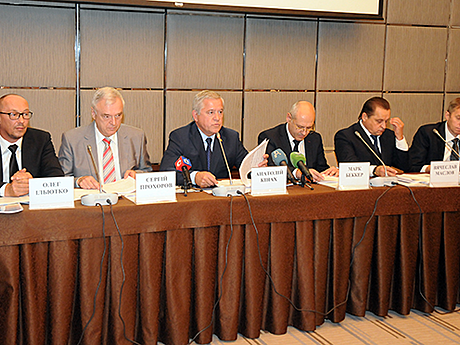
The Anti-Crisis Council of Non-Governmental Organizations of Ukraine and the Management Board of the Ukrainian League of Industrialists and Entrepreneurs (ULIE) held an enlarged meeting in Kharkiv on September 25, 2015, to discuss the course of the implementation of the Anti-Crisis Program of Joint Actions of the Government and Businesses, entrepreneurship development, revival of the industrial complex in Kharkiv region, and business problems in the regions neighboring the Anti-Terrorist Operation (ATO) zone in eastern Ukraine.
"An effectively operating economy could be a factor that will surely strengthen political stability in the country, become the best campaign for statehood and territorial integrity, and increase a sense of patriotism among the people. The government in equal and mutually responsible partnership with the business community has to do the utmost to stop destructive crisis trends as soon as possible and switch the economy to the stable development rails," Head of the Anti-Crisis Council of Non-Governmental Organizations and ULIE President Anatoliy Kinakh said.
While describing the economic situation in Kharkiv region, Deputy Head of Kharkiv Regional State Administration Mark Bekker stressed the importance of programs for the support of the machine building industry which has a huge potential in the region. Head of the ULIE Office in Kharkiv region Oleh Ilyutko expressed concern about the fact that aggression in the eastern area of the region has changed the economic model and raised the issue of redirecting exports to other foreign markets. Old approaches have become outdated and a new industrial policy and more active communication with businesses are necessary, he said. An outstanding scientist and public figure, Volodymyr Semynozhenko, then insisted that new products and technologies should be introduced as soon as possible to ensure Ukraine's competitiveness on foreign markets. He also said that the state support for modern scientific research and IT industry should be increased.
According to Kinakh, the economic situation in the country today does not show a tendency towards the recovery from crisis and sustainable development. Real gross domestic product (GDP) dropped by almost 14.6% in Q2, 2015, in comparison with the same period in 2014. Meanwhile, industrial output and construction have dropped by 18% and 26.7%, respectively.
Today's monitoring of the anti-crisis program implementation shows that no serious positive changes have occurred lately. Proper protection of property rights has not been ensured and regulators' and supervisors' pressure on businesses has not been reduced.
Members of the Anti-Crisis Council of Non-Governmental Organizations and the ULIE Management Board said that the implementation of the anti-crisis program has to be intensified and called on the country's leaders to deepen communication with businesses, as in the light of the huge risks Ukraine is facing today it is extremely important to consolidate all responsible, pragmatic and patriotic forces. They also approved a decision to update the anti-crisis program.
The participants in the meeting also seriously discussed the development of the industrial potential in Kharkiv region, which, despite a slump in industrial output, is still holding rather high positions in international competitiveness ratings in terms of capacity for innovations, quality of research and development institutions, cooperation of scientific and production structures, education development, and presence of scientists and engineers. The government and businesses only have to focus their consistent activities on the recovery from the crisis and use Ukraine's huge economic potential. It was also proposed to create strong integrated research and production facilities in various branches in the region, establish an innovations cluster in the chemical industry, etc.
For the first time, during its meeting in Kharkiv, the business community raised the problems faced by businesses in the ATO zone and in the regions neighboring it. The participants in the discussion stressed that the enterprises, which had partners in the territory that is currently controlled by separatists (mining and processing industries), are facing serious difficulties today. The entrepreneurs that have moved out from the ATO zone are having difficulties with transferring their businesses to Ukrainian-controlled territory and conduct further business activities due to the lack of finance and capital assets. More than one million people have moved from the temporarily occupied territory and the ATO zone to other regions. They need jobs and means of subsistence.
The business community thinks that in order to create favorable conditions for activities of 'risky' businesses it is necessary to prolong the moratorium on scheduled and unscheduled checks of businesses until the end of 2016, approve a national development program for crediting of small- and medium-sized businesses, and elaborate an employment program, first of all, including the restoration of infrastructure facilities in Donetsk region.
The participants in the enlarged meeting of the Anti-Crisis Council of Non-Governmental Organizations and the ULIE Management Board also approved a range of decisions that will be submitted to the Ukrainian government.